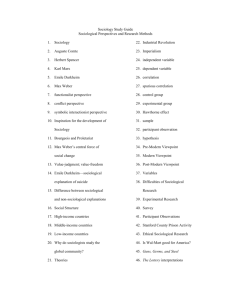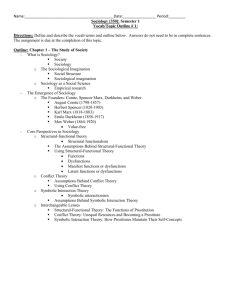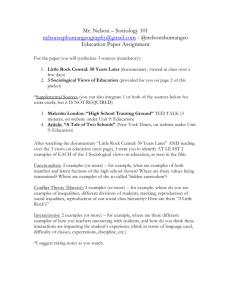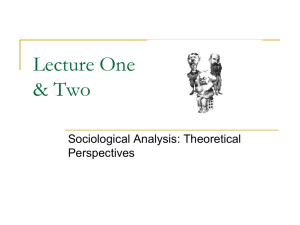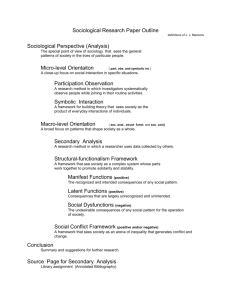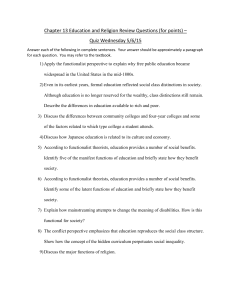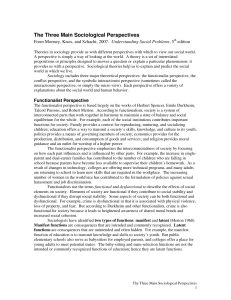Ch.1 The Sociological Perspective Name: Date: Period: TRUE
advertisement
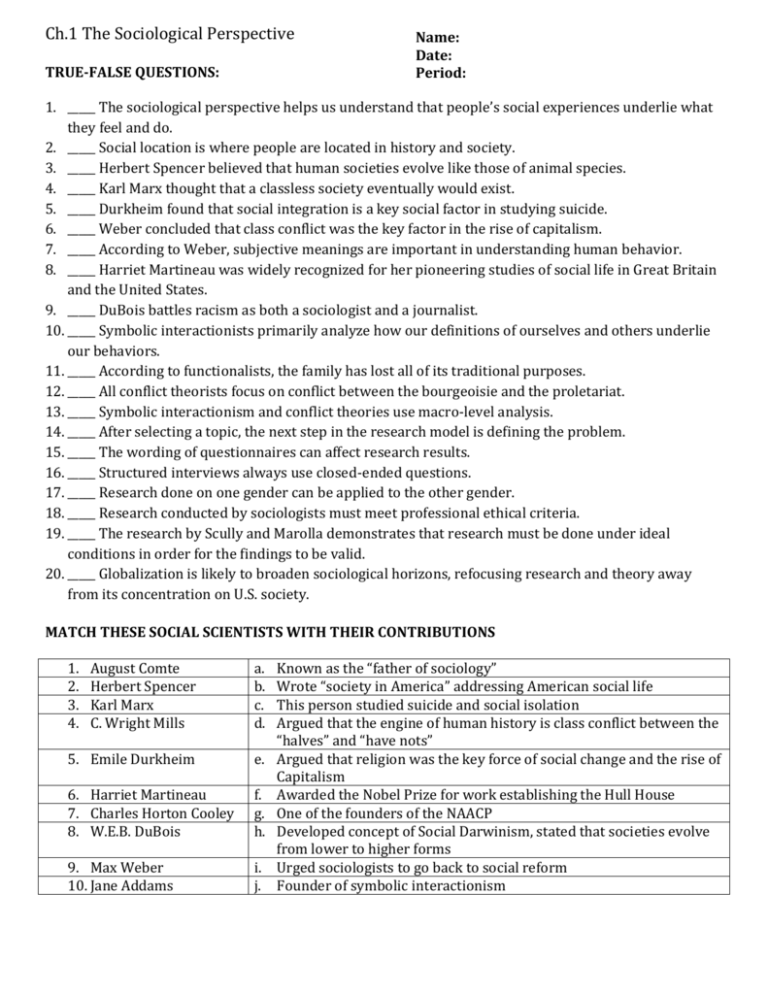
Ch.1 The Sociological Perspective TRUE-FALSE QUESTIONS: Name: Date: Period: 1. _____ The sociological perspective helps us understand that people’s social experiences underlie what they feel and do. 2. _____ Social location is where people are located in history and society. 3. _____ Herbert Spencer believed that human societies evolve like those of animal species. 4. _____ Karl Marx thought that a classless society eventually would exist. 5. _____ Durkheim found that social integration is a key social factor in studying suicide. 6. _____ Weber concluded that class conflict was the key factor in the rise of capitalism. 7. _____ According to Weber, subjective meanings are important in understanding human behavior. 8. _____ Harriet Martineau was widely recognized for her pioneering studies of social life in Great Britain and the United States. 9. _____ DuBois battles racism as both a sociologist and a journalist. 10. _____ Symbolic interactionists primarily analyze how our definitions of ourselves and others underlie our behaviors. 11. _____ According to functionalists, the family has lost all of its traditional purposes. 12. _____ All conflict theorists focus on conflict between the bourgeoisie and the proletariat. 13. _____ Symbolic interactionism and conflict theories use macro-level analysis. 14. _____ After selecting a topic, the next step in the research model is defining the problem. 15. _____ The wording of questionnaires can affect research results. 16. _____ Structured interviews always use closed-ended questions. 17. _____ Research done on one gender can be applied to the other gender. 18. _____ Research conducted by sociologists must meet professional ethical criteria. 19. _____ The research by Scully and Marolla demonstrates that research must be done under ideal conditions in order for the findings to be valid. 20. _____ Globalization is likely to broaden sociological horizons, refocusing research and theory away from its concentration on U.S. society. MATCH THESE SOCIAL SCIENTISTS WITH THEIR CONTRIBUTIONS 1. 2. 3. 4. August Comte Herbert Spencer Karl Marx C. Wright Mills a. b. c. d. 5. Emile Durkheim e. 6. Harriet Martineau 7. Charles Horton Cooley 8. W.E.B. DuBois f. g. h. 9. Max Weber 10. Jane Addams i. j. Known as the “father of sociology” Wrote “society in America” addressing American social life This person studied suicide and social isolation Argued that the engine of human history is class conflict between the “halves” and “have nots” Argued that religion was the key force of social change and the rise of Capitalism Awarded the Nobel Prize for work establishing the Hull House One of the founders of the NAACP Developed concept of Social Darwinism, stated that societies evolve from lower to higher forms Urged sociologists to go back to social reform Founder of symbolic interactionism Ch.1 The Sociological Perspective FILL-IN-THE-BLANK QUESTIONS: Name: Date: Period: 1. The _________________________ stresses the social contexts in which people are immersed and that influence their lives. 2. _________________________ refers to the corners in life that people occupy because of where they are located in society. 3. A _________________________ is a statement that goes beyond the individual case and is applied to a broad group or situation. 4. Using objective, systematic observations to test theories is known as the _________________________. 5. Compte stressed that sociology would not only discover social principles, but also would apply these to social _________________________. 6. _________________________ is used to uncover bias in research by repeating a study in order to compare results with original findings. 7. _________________________ analysis is a theoretical framework in which society is viewed as composed of various parts, each with a function that contributes to society’s equilibrium. 8. If an action is intended to help some part of a system, it is a _________________________ function. 9. Conflict theorists see _________________________ as reflecting society’s basic inequalities between male and females. 10. Functionalists and conflict theorists focus on the _________________________ level; that is they examine large-scale patters of society. 11. Symbolic interactionists focus on _________________________, what people do when they are in one another’s presence. 12. A survey researcher needs to make sure questions are _________________________. 13. A tension between social reform and _________________________ has always run through sociology. 14. The _________________________ variable causes a change in another variable. 15. _________________________ is the breaking down of national boundaries because of advances in communication, trade, and travel.


